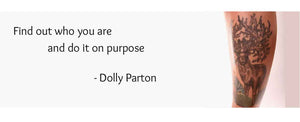
I have worked in the skin care industry for over 16 years, and I get these questions all the time; what does natural mean and what is organic skincare? These terms are thrown around a lot in the skincare industry. Labels say 100% natural, or organic, or made with organics, but what does that really mean, and who made up those regulations?
Natural skin care is not a regulated term yet and certified organic is a system that is designed for agriculture, not for skin care. There are several agencies in the US that are trying to gain dominion over the terms “natural” and “organic” and their use in skin care products, but no one agency has come out on top yet. Most guidelines for skin care fall under the same guidelines as dietary supplements, but those two types of products are not the same. Having the same guidelines for each makes it extremely difficult to be in compliance when it comes to creating effective skin care products.
What does this Mean When it Comes to Healing your New Tattoo?
A natural ingredient means from nature, no chemicals to alter the product, and no synthetic way of changing the ingredient from one form to another. When referencing a finished product, the whole product (packaging included) must be recyclable or renewable. Plant extracts, oils, butters, and essential oils are all healthy, positive ingredients that come from nature and can help your body.
Organic in terms of certified organic; means the ingredient is grown without the use of conventional pesticides or chemicals, growth hormones, genetically modified origins, and that these processes are documented and tracked over a certain amount of time to ensure the quality of the growing environment. All ingredients listed on Susie Q Skin Care’s ingredient decks that state “organic” are certified organic.
When selecting your natural anti-aging skin care and tattoo aftercare products, we believe strongly in choosing nature over man made chemicals. Products like Vaseline and Aquaphor are cheaper, but they are full of nasty additives that do not nourish your skin. Your tattoo is not only your art, it is also a portal inside your body.
Want some more details? Keep Reading…..
Agencies in the Game
The FDA (Food and Drug Administration) is the governing agency in the US that is responsible for:
- Protecting the public health by assuring that foods (except for meat from livestock, poultry and some egg products which are regulated by the U.S. Department of Agriculture) are safe, wholesome, sanitary and properly labeled
- Ensuring that human and veterinary drugs, and vaccines and other biological products and medical devices intended for human use are safe and effective
- Protecting the public from electronic product radiation
- Assuring cosmetics and dietary supplements are safe and properly labeled
- Regulating tobacco products
- Advancing the public health by helping to speed product innovations.
The FDA has the final say about what is on our product labels, how ingredients are listed, what is recognized as “reasonably” safe for ingestion (both through the skin and by ingestion), and which products must be labeled as OTC (over the counter). This means they are considered medical treatments and claim to cure or remedy a health issue or malady. The FDA does not regulate or certify any personal care products as organic or natural.
Defining Natural Skincare Products
In 1936, the Natural Products Association (NPA) was established. They claim to be the oldest non-profit agency dedicated to natural products. In recent years they have become one of the loudest voices supporting and pushing for legislation for natural skin care and supplement regulation.
Per their website, “Under the Natural Standard for Personal Care Products, allowed ingredients come from or are made from a renewable resource found in nature (flora, fauna, mineral), with absolutely no petroleum compounds”. The clause about no petroleum compounds is paramount. because crude oil (petroleum) is technically natural, but it is in no way healthy for us or our planet.
The NPA has defined four areas they consider to be parameters to define “natural” products:
- Natural Ingredients: A product labeled "natural" should be made up of only, or at least almost only, natural ingredients and be manufactured with appropriate processes to maintain ingredient purity.
- Safety: A product labeled "natural" should avoid any ingredient with a suspected human health risk.
- Responsibility: A product labeled "natural" should use no animal testing in its development.
- Sustainability: A product labeled "natural" should use biodegradable ingredients and the most environmentally sensitive packaging.
Susie Q Skin tattoo aftercare products comply 100% with these guidelines.
Certified Organic Skincare Products
USDA/NOP - The United States Department of Agriculture is the only agency that officially regulates the term “Certified Organic”. The program for certifying organic products under the USDA is called NOP (National Organics Program). According to their regulations, the NOP’s organic standard:
“Regulates the production and handling of farm raised crops, wild harvested crops, and livestock management. Organically produced crops are grown without most conventional pesticides, petroleum-based fertilizers, or sewage sludge-based fertilizers. Organically raised animals cannot be given hormones or antibiotics, and they must be fed organic feed and be given access to the outdoors. A certified organic product composed of a percentage of organically grown and processed ingredients.”
All products that are certified by the NOP must comply with a minimum criterion for production, handling, processing, labeling, and certification standards. The NOP has four categories of certification.
- 100% Organic: A product must contain 100% organically produced ingredients (excluding water and salt) and may prominently display the USDA organic seal and the percentage.
- Organic: A product must contain at least 95% organically produced ingredients (excluding water and salt), the remaining percent must be organically grown if commercially available or consist of a non-agricultural substance that is on the USDA Organic approved ingredient list. The product may prominently display the USDA organic seal.
- Made with Organic Ingredients: A product must contain at least 70% organically produced ingredients (excluding water and salt), and the products may not display the USDA Organic seal but may highlight up to three organic ingredients. Both Susie Q Ink Oil and Ink Salve contain more than 70% certified organic ingredients. Ink Oil contains 98% certified organic ingredients.
- Less than 70% Organic Ingredients: A product that contains organically grown ingredients but does not meet any of the first three standards may not use the term “Organic” unless specifically listing USDA certified organic ingredients on the back panel. The USDA organic seal may not be displayed.



